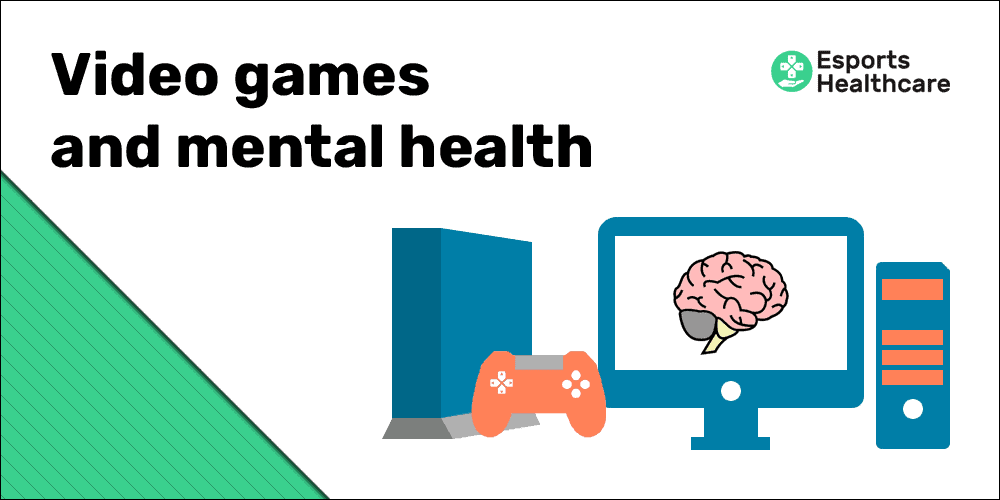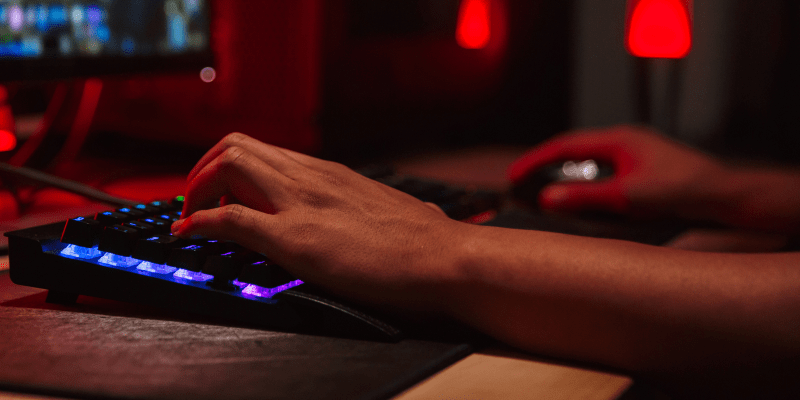Video games and mental health: a powerful tool for good or for bad

Key points
Disclaimer
This information is for educational purposes only and is not intended to replace the advice of your doctor. Esports Healthcare disclaims any liability for the decisions you make based on this information.
The information contained on this website does not establish, nor does it imply, doctor-patient relationship. Esports Healthcare does not offer this information for diagnostic purposes. A diagnosis must not be assumed based on the information provided.
Outside the esports, gaming, and streaming communities, there are many misconceptions about video games and mental health—specifically about the potential negative effects.
This is largely due to previous claims from mental health experts reporting that playing video games cause anger problems, cause your health to decline, and decrease your social ability to interact with others. Similar, unfounded claims have been made on how shooting and fighting games increase aggression in someone’s everyday behavior.
In order to enhance your quality of life, it’s important to understand how our everyday activities affect our mental health. In this post, we’ll look at the association between video games and mental health.

Why is mental health important?
Before we can discuss the relationship between video games and mental health, we need to first discuss the importance of mental health in overall wellness.
Mental health (sometimes grouped together as mental-emotional health) encompasses our emotional, psychological, and social well-being. It is the state of our minds in which we feel and act in different situations.
For example, someone with a positive mental-emotional outlook would be more likely to have healthy relationships with everything around them when compared to someone with a negative mental-emotional outlook.
Mental health also includes the people in our lives, our finances, our hobbies, our career, and having a positive relationship with ourselves. The way we think, act, and feel on a daily basis will positively or negatively affect every area of our lives.
Improving our mental health should be a lifelong process because it affects the way we perform, our level of happiness, and whether or not we can thrive in everyday life.
Video games and mental health: the benefits
With COVID-19 changing the social-climate of the entire world, many people turned to video games for leisure and for social interaction. Although the pandemic has been a worldwide nightmare, it has allowed for a larger population to experience the positive effects that gaming has on our psychological health.
According to Forbes, the gaming industry has seen a 73% growth since the beginning of 2020, and over the last 5 years, there has been more research linking video gaming to positive mental health and well-being.

Positive support system
Communicating in a team environment while playing video games has been shown to enhance the quality of communication and deepen relationships with team members.
In the esports community, it is commonplace for gamers to form new friendships. Video games have also allowed for improved maintenance of these friendships—particularly when friends aren’t in the same geographical area.
In other words, it’s not just a sub-community but rather a culture and a way of life. During the pandemic, many gamers have reported playing video games with their friends has been a great way to stay connected since seeing each other in person has been a limited or impractical option.
Iván Gonzalez, a licensed mental health counselor with whom we spoke, says throughout his life, playing video games has been highly satisfying and states they are “a way to engage socially with others to accomplish difficult tasks in an engaged environment different from my current own reality.” Iván also says that as his generation gets older, it’s a great way to stay connected with friends.
Therapeutic in nature
Gaming can be therapeutic in nature and can serve as a stress reduction tool as we go through our own troubling times. Many people report playing video games helps them to relax after a long day at work. So often, video games help people find a sense of control, and video games can be a safe and comfortable escape from real-life stressors.
This is similar to the increase in visits to movie theaters during World War II as it served as a safe and comfortable place to escape from the stress of the time.

One individual (name withheld) stated that he purchased a Nintendo Switch so he could play Sim City during a difficult time in his life. “It helped me zone out and kept my mind from thinking about stressful circumstances,” he said. For this person, playing a video game from his childhood was nostalgic and brought back happy, stress-free memories.
Goal setting and meaning
Staying involved in activities that are meaningful and enjoyable can help contribute to boosting your positive mental state. A Stanford University study investigating the positive effects of video games reported that many players state they feel they are part of something bigger than themselves when they are engaged in a video game.
For example, coming together collectively to kill an invading alien race and save the earth can provide a significant amount of purpose. These moments also help us to understand that each person’s purpose is subjective to themselves and that we can find fulfillment in any area of our lives.
Finding purpose and meaning is an essential piece to living a happy life. Video games can offer meaning to one’s life through collaboration—such as achieving goals as a team. Achieving goals in video games can also significantly boost your morale.
Sense of achievement
In addition to purpose, achievement is another essential ingredient to achieving a positive mental state. Setting and achieving goals can boost your confidence level and give you a deeper sense of purpose. For example, when a player or team accomplishes a task in a video game, it can give that player the confidence to try something new in the real world.
Video games and mental health: the negatives
While video games can provide incredible mental health benefits, there are certainly negative effects, as well. Simply stated, too much of anything in our lives is a bad thing.
According to the National Institutes of Health, too much time spent playing video games can negatively affect your mental health—primarily due to a lack of physical activity rather than the game affecting your mental health, directly. Unfortunately, there is a general lack of full-body movement and exercise while playing video games.

Lack of physical activity will negatively affect all aspects of your health, and mental health is no exception. Holistic wellness includes getting enough sleep, eating nutritious foods, getting enough exercise, fostering relationships, and preventing and/or rehabilitating injuries or ailments.
It is important for all of us to assess the amount of time we spend playing video games. If video games begin to negatively affect our personal or professional well-being, it may be necessary to take a step back.
Video game addiction
So, how much is too much? Video game addiction is in reference to when the time spent gaming begins to negatively affect all other areas of your life. If you’re unsure whether you could have an addiction, take a look at your responsibilities (e.g., your performance at school or work) and your relationships and try to understand if your attention is lacking.
Other common signs include neglecting hobbies, symptoms of physical or psychological withdrawal, or signs of irritability or anger when forced to stop gaming for a period of time. If you feel you have a video gaming addiction, we suggest you contact a mental health professional in your area. Check out our list of emergency and crisis resources if you need help finding a mental health professional.
Using video games to avoid real-life problems
The best way to improve your mental health is to first understand who you are as a person. Then, you will be able to process your emotions and beliefs towards situations in your life.
Too much time spent playing video games to avoid real-life situations can be detrimental to someone’s healing. Although problems in your life may be difficult to face, these issues need to be addressed in order to appropriately cope.

Video games can certainly be a healthy addition to your mental state but only if you are taking care of your mental health and using video games as an additive to other positive healthy behaviors.
Summary
Overall, individuals who have a high level of emotional intelligence, who have a purpose or mission in life, and who have a goal to work towards are usually happier and more satisfied with life when compared to people who do not.
Playing video games can provide a high level of satisfaction, a sense of community, and provide stress relief in daily life. It can also improve certain skills such as communication, cognitive ability, hand-eye coordination, quick decision-making, and team-building skills.
And, while there are many benefits to playing video games, there are also negative effects. It’s important to assess the priorities in your life and maintain focus on these things. Video games have provided a supportive community that has helped many people from youth through adulthood.
At the end of the day, moderation is key. Video games and mental health are intimately connected; continue playing your favorite games for the benefits, but be wary of the potential to overdo it.
